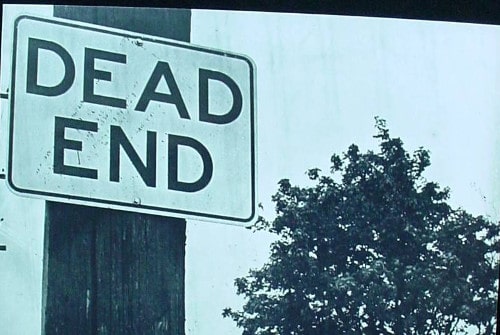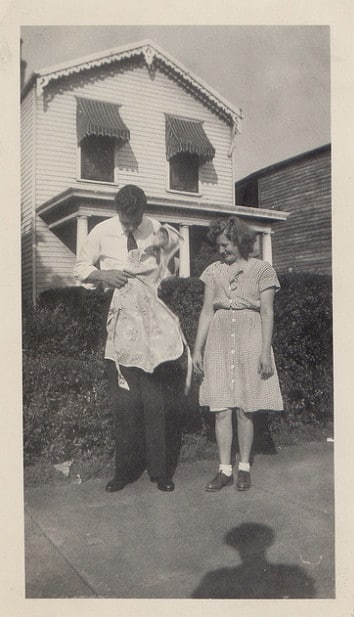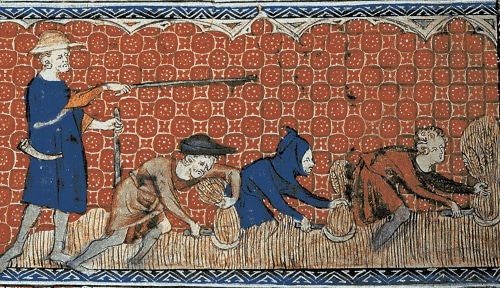
What a journey we’ve been on.
For the last few months we have been delving deeply into the nature of manhood – its origins, historical imperatives, and standing in the modern world.
First we explored the fundamental tenets of the ancient code of manhood, and demonstrated that in 99% of cultures around the world, in every age up until the present, a male who wished to be considered a man had to strive to protect, procreate, and provide. In so doing we uncovered the perhaps surprising fact that a concern about being manly is far from uniquely Western or modern; not only is the code of manhood timeless and universal, but so is men’s desire to keep it and to earn the title of man. Manhood has been a goal for almost every man since the dawn of humanity.
We then established that far from being merely a cultural construct, manhood has its roots in the unique, biological characteristics of males. The imperatives assigned to men are designed to fulfill collective needs, but men are chosen and drawn to these particular missions because of their innate traits, predispositions, and drives. Cultures seek to channel men’s biological potentialities towards service to the greater good.
Next, we discussed the idea that an emphasis on manhood shrinks as a society’s resources increase. The easier it is to obtain resources, and the less they must be protected from others, the less men need to be “good at being men.” In safe, plush periods and places, men can afford to slack off because there won’t be any immediate repercussions – either to their reputation or their own survival and the survival of their loved ones and neighbors.
Finally, we used the foregoing context to explain why, though a culture of manhood is currently quite weak in our resource-abundant age, we remain deeply conflicted about this waning masculinity: while manly men aren’t needed at the present moment, we worry that someday they might be, but won’t be ready to fight and rise up to the challenge.
The next natural question then is: where do we go from here?
How should men live their lives in a time when traditional manhood is not needed, and in many cases not even wanted or respected? Is there any reason to strive to live the manly code if it does not come with societal honor and reward, and if failure to do so carries no threat of shame? Is it possible to conceive a manhood that stays true to the past but also offers men a way to move forward?
Next week I will attempt to answer these questions and provide men with a possible roadmap for living as a man in the 21st century.
The path of manhood I will lay out is of course not the only one. There are a lot of different voices out there, advocating for men to go this way or that. So I first think it important to outline the other options that exist in order to explain why I think they are ultimately dead ends, and why I have sought a different way.
The Dead End Roads Back to Manhood
These are of course not the only options presented to a man who wishes to pursue manhood in our modern times, but they are the three most popular:
Option #1: Accept that masculinity is a cultural construct and choose to live a “re-defined” masculinity (or eschew masculinity as a goal altogether).

This is currently the default position of society. Much of popular culture and the media tout the idea that masculinity is outdated and wasn’t “real” to begin with, and that the vestiges of this cultural construct which persist are the cause of many of society’s ills.
Men who choose this path seek to re-define masculinity in a way that smoothes out its rough and supposedly destructive edges, and encourage other men to adapt to the modern age by adopting more traditionally feminine traits and pursuits. They see the pursuit of any kind of traditional manhood as silly and sexist.
Disparaging masculinity is particularly appealing to those men who depart sharply from the traditional code of manhood. If there is a part of them that feels insecure and ashamed of their shortcomings (and in nearly every man there is, whether they can admit it or not), this cognitive dissonance is quickly and readily squashed by telling themselves, “The whole idea of manliness is stupid anyway.” In adopting this maxim, such men not only save themselves from the effort of trying to strive to be manly (and the potential of failing in that endeavor), but also buttress an identity for themselves as enlightened and superior to their “brutish” brethren who have failed to get with the program.
Masculinity-as-cultural-construct is one of those beliefs that sounds good in the abstract, perhaps. But I think most folks, men and women alike, feel deep in their gut that it isn’t so, isn’t desirable, and isn’t working. As someone who has examined the research and history of masculinity, I find the idea of it being wholly a cultural construct utterly untenable. It is a conclusion one can reach only by willfully ignoring large swaths of the data and the human experience.
Chucking the old code of manhood was supposed to be liberating for men and women alike. Yet men’s suicide rates are sharply rising while their college graduation rates are falling. Men increasingly wish to opt-out of contributing to society at all. They feel restless and adrift. And women have been left to wonder, “Where have all the good men gone?”
For the last 50 years we have tried an experiment in enforced androgyny. How has it gone? Certainly there have been some positives that have come out of feminism. But can anyone look at society today and say, “Things are really going great!” Masculinity has undeniably been at the root of some great ills, but it has also been the driving force behind so much that is good (see: civilization). Why throw out the baby with the bathwater?
Option #2: Keep modern civilization, but reverse the tide of feminism.

Just as there are those who point to masculinity as the source of society’s woes, there are those who lay the blame for our faltering culture squarely at the feet of feminists.
These men would like to turn back the clock to a time when patriarchy ruled, and men were honored and respected.
There are several problems with this approach.
First, many men who take this stance, though they say that manhood isn’t about women, are consumed with thinking about them! The focus of their lives is all about women – why they’re angry at them, why they’re not as good as they used to be, and how to pick them up and have sex with them (because while women are awful, they’re still good for one thing). Though manhood should be all about men – how men test and sharpen each other, what men need from each other in dire times, what men respect in each other – for these men their pursuit of manhood revolves around women.
Second, there aren’t any post-civilization “good old days” to return to. To men who want to go back to a better time, I would ask, what time would have been preferable? Is it the early 20th century, when most men were so “respected” they got to work 12 hours a day, six days a week? When they got used as cannon fodder in WWI? When thousands died on the job because corporate bosses considered them more expendable than mules, since the animals cost more?
The 19th and 18th centuries might have held some appeal, if you were a landowner. Not so great if you were an indentured servant, or a slave, or a tenant of a greedy landlord. Men were so “respected” back then that you could own them like a piece of property!

The good old days…when men were so valued they could be the property of other men!
How about the Middle Ages then? Then you could enjoy all the dignity of a serf, a man who relied on his lord’s beneficence for his sustenance, who could not move without his lord’s permission, who had to work on the property of another before tending to his own, and who likely wouldn’t live beyond 40.
Well, what then about the 1950s, that period we most often look back on as the golden age? The fifties were certainly a special time, an anomaly made possible by the end of WWII. And there is much we can learn from that time – hence the vintage motif of this website. Men were manly; women were womanly. Yet, plenty of men were unhappy back then, too. I’m a big fan of The Twilight Zone, the classic television series produced during this era. And what has struck me is the nostalgic tenor of so many of the episodes – men are driven to suicide by cold, shrewish wives and corporate bosses that try to work them to death; they worry about the conformist, unthinking culture; and they wish they were living in a small rural town at the turn of the century, back when everything was wonderful. They’re living in what we consider the apex of the good old days, and they’re nostalgic for the good old days — farther back!
In truth, while the last 50 years represents an unprecedented period (the first time in history in which manhood itself as a concept has been denigrated and denied), ever since the dawn of civilization men have been oppressed, in one way or another (just as many other groups of people). When we gaze back through time, we usually imagine ourselves as the rich business owner, or prosperous farmer, or the royal baron. But chances are, we would have been the lowly peasant. Dependent and emasculated. In nearly every time up until the present, the only men who got to be men were the elite. The manhood of everyone else was ground down.
Third, and most importantly, anti-feminism offers little in the way of constructive suggestions on what men should do and how they should live their lives. In the last post, commenters took issue with my downplaying of feminism, saying it really is a serious threat to civilization. What I did not see, however, was a single constructive idea on what to do to fight this supposed menace. If you think feminism is a serious threat, what then do you plan to do about it? Is it a policy or governmental change that’s needed? If so, how do you plan on getting millions of people who currently vote for feminist-friendly legislation to back it? Or maybe everyone just needs to convert to Christianity? If so, how do you plan to make fervent believers out of the population?
If pressed for a call to action, men’s rights advocates can generally only come up with “raising awareness.” There’s certainly nothing wrong with raising awareness of men’s issues and of masculinity’s ailing state, but what then? There’s a vague idea that with enough awareness raising, people will rise up and demand sweeping cultural change.
I doubt it. Opinions are well entrenched. Pro-feminist policies bring benefits to enough people that they aren’t going to be changed.
As discussed last time, I think anti-feminists are mistaken in the belief that feminism caused the downfall of manhood. Feminism was a natural byproduct of the increase in peace and plenty during the 20th century. Nor is it the sole cause of societal decline – rather it is part of a complex constellation of factors that include economics, class, religion, and technology. “Fixing” feminism would not magically fix the world’s problems. Once the cat is out of the bag, you can’t stuff it back in.
Patriarchy arose because of the harsh nature of primitive life – women and children needed men to protect and provide for them. It was the physical reality of the world they lived in. You can’t simply try to overlay a patriarchal structure onto a cushy, abundant world where everyone relies on the government for protection and men and women can do the vast majority of jobs equally well. It’s never going to work.
Option #3: Chuck civilization and return to tribalism.

Men who are intellectually honest and have really thought about these issues realize the truth of the above. If you want to return to patriarchy, and a time where men could fully exercise the “tactical virtues,” you have to re-create the environment in which they were spawned.
Recognizing patriarchy’s incompatibility with the modern, techno-industrial world, these men offer another more radical solution: blow up civilization (like in Fight Club) or try to hasten its demise by opt-ing out of contributing to it, and return to a stateless, dangerous world in which primal manliness is once again needed.
I’ll admit there’s a certain romantic, Dionysian appeal to this idea, especially for a single man. It’s probably why zombie apocalypse movies have been so popular in the zeitgeist. But sudden societal collapse is likely more fantasy than reality. Awareness-raising can only make partial inroads and ultimately cannot cause a dramatic shift in the culture. More radical, even terroristic actions would be needed to return to a time of battling clans. You’d literally have to blow stuff up.
But people aren’t primed for this kind of radicalism. They love their creature comforts, and are easily pacified with an iPad, a Hot Pocket, and a smartphone.
Even those who do not put too much stock in material goods still see much in modern civilization to protect and hold onto. Despite our notions of the “noble savage” and the rosy view of being the uncivilized tribesman of thousands of years ago, life was way less romantic than we imagine. Reading anthropologist Napoleon Chagnon’s account of life among the primitive Yanomamo people demolished my ideas of frolicking in the jungle as an awesome hunter-gatherer man. Theirs is a dirty, brutal life in which one must constantly look over one’s shoulder.
As a husband and as a father of two young children, I’ll admit that a Cormac McCarthy-esque post-apocalyptic world holds no appeal for me. Say what you want about the spiritually hollow culture of first world industrial societies, but I’m glad I don’t have to worry about my wife and kids getting kidnapped and raped.
So, I don’t think people are going to be revolting in the streets and tearing down our civilization anytime soon (though one can never tell when a “Black Swan” may arrive). Our current political and social arrangement — as decrepit and rundown as it is — will likely continue lumbering on for the foreseeable future until we achieve Idiocracy. “Welcome to Costco. I love you.”
The kind of crisis that could turn the world upside down and necessitate a cultural return to the way of men – like another world war – is out of the hands of the average man. So one can ponder it, and perhaps hope of it, and as I’ll argue next time, definitely prepare for it, but what do you do until then? There are those who advocate that you simply enjoy the decline – go your own way and do as little work and have as much sex as possible. What of the men who, drawing on thousands of years of philosophical and spiritual wisdom, believe that such a path is ultimately empty and unfulfilling? Are they doomed to be members of the “cult of non-virility”?
Is There Another Way?
The options and outlooks above are popular because they offer a compelling, emotionally satisfying narrative that explains what has gone wrong in our current culture. What they don’t offer is much in the way of constructive guidance on how a man can live a good life while simultaneously scratching that primal itch for a virile manhood.
That’s the kicker for me. Journalists, social critics, and bloggers are great at writing about the dismal state of modern masculinity. You can’t go a week without running across an article about why men are falling behind or a post about how modern society is unfriendly to men.
Yes. We know. Something is wrong. What can we do about it?
Sitting down at a computer and complaining and venting to a forum of like-minded men might be immediately satisfying, but it’s not ultimately fulfilling. Getting all worked up without taking action is nothing more than mental masturbation.
What’s a practical approach for a man who likes some aspects of modern civilization but also wants to live the code of manhood?
Even if you want to return to a time without feminism or a tribal life, how should you live before that shift comes about? How should you live right now, as a man in 2014, in your day-to-day life?
Next week, I will offer my humble suggestions for another option, a different path, a framework that seeks to wed tradition to the realities of modernity. A way that reaches back and yet moves men forward.
Read the rest of the series:
Part I – Protect
Part II – Procreate
Part III – Provide
Part IV – The 3 P’s of Manhood in Review
Part V – What is the Core of Masculinity
Part VI – Where Does Manhood Come From?
Part VII – Why Are We So Conflicted About Manhood?
Part IX – Semper Virilis: A Roadmap to Manhood


